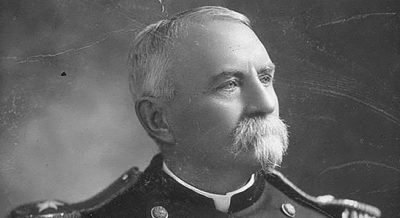Editor’s Note | By Bret Bradigan
The March of Times
The Vacancy in the Heart of Los Angeles

Harrison Gray Otis
My favorite character assassination of all time was in the early 1910s from Bay Area-based California Gov. Hiram Johnson about the owner of the Los Angeles Times, Harrison Gray Otis: “We have nothing so vile, nothing so low, nothing so debased, nothing so infamous in San Francisco as Harrison Gray Otis. He sits there in senile dementia, with gangrened heart and rotting brain, grimacing at every reform, chattering impotently at all things that are decent; frothing, fuming, violently gibbering, going down to his grave in snarling infamy.”
That was when newspapers in general, and the Times in particular, were much more influential and feared, and so were subject to much calumny as well as admiration.
It’s a sad sign of the Times, so to speak, that they are giving up their historic downtown headquarters this week, and making the final move of their operations to the suburban anonymity of El Segundo, where new owner, biotech billionaire Patrick Soon-Shiong, is building a modern campus.
The vacancy will leave a big gap in an already fragmented Los Angeles, famously referred to by Dorothy Parker “as 72 suburbs in search of a city.”
It was an interesting twist that the Times, much maligned for its first 100 years for its relentless boosterism of the southern California’s interests — which were not coincidently closely aligned with Otis’ personal interests — became a respected national institution during the 1980s and 1990s under the leadership of his great-grandson, Otis Chandler, who lived in Ojai for many years.
It was a pleasure and privilege to get to know Otis (as he insisted on being called) during his years in Ojai. He told me he wanted to become a community newspaperman, living and working in a small town, where he could make a lasting difference with his sturdy sense of fairness and higher purpose.
A larger-than-life figure, Chandler was the only person I knew who was attacked by a musk ox, which happened during an Arctic hunt where he was severely injured at the age of 70. That was about par for the course for him.
Another former Ojai resident is author Dennis McDougal, called “Los Angeles’ No. 1 muckraker,” who wrote “Privileged Son,” about Otis Chandler, but also about newspapering’s heyday. Los Angeles itself plays a major supporting role.
Johnson, a leader of the progressive movement and Teddy Roosevelt’s vice presidential candidate with the quixotic Bull Moose Party during the 1912 election, was opposed at every turn by Otis, who was often referred to as “the Governor of Southern California.”
It was a big day when the Times building opened on July 1, 1935. Will Rogers was the master-of-ceremonies and Bing Crosby crooned. It feels different now. Hollowness in the soul of the city. I have great confidence in Los Angeles, but this is a big blow.

Leave A Comment